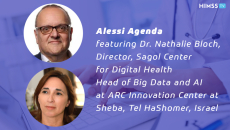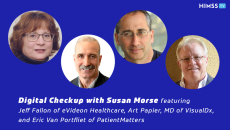Global
Cotiviti uses its COVID-19 Outbreak Tracker to leverage claims and clinical data for payers to use and share with providers, says President and CEO Emad Rizk, MD.
Kevin Phillips, VP of product management at Capsule, discusses the use of digital tools to stream data from tools ranging from ventilators to monitors.
Remote monitoring is changing chronic care management, explains CAREMINDr President and CEO Harry Soza.
Medicomp CEO Dave Lareau discusses how his company made early coronavirus-specific changes to its database and AI engine as the pandemic took hold in February and has continued to innovate since then.
Dr. Nathalie Bloch, head of big data and AI at the ARC Innovation Center at Sheba Medical Center, Israel, discusses the use of AI in dealing with COVID-19 patients in this episode of The Alessi Agenda.
Dr. Roy Schoenberg, CEO of Amwell, describes how COVID-19 is impacting his telehealth company and is rewriting the expectations for virtual care.
Biofourmis founder and CEO Kuldeep Singh Rajput discusses remote monitoring's role in reaching patients at home and reducing contact with COVID-19-positive patients.
Joel Diamond, MD, CMO of 2bPrecise, discusses pharmacogenomics as a good entry point for providers in precision medicine, identifying the right medicine for better outcomes and patient satisfaction.
Technology issues for interoperability are more of a cultural than a deployment challenge, explain Drew Ivan, Lyniate's chief product and strategy officer, and Matthew Michela, CEO of Life Image.
Consumer-centric healthcare means patients have access to their cost and data and are part of the discussions with their doctors about their healthcare options.









